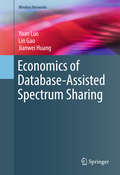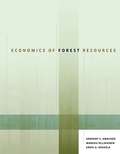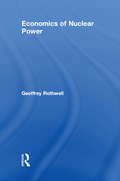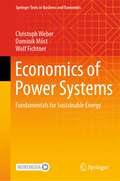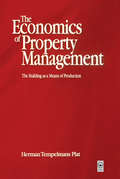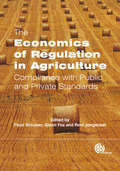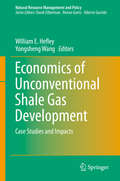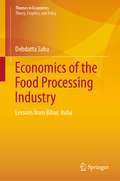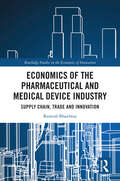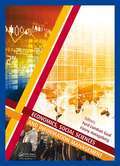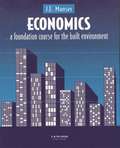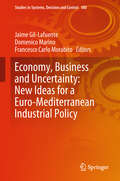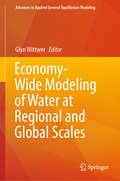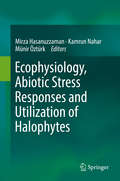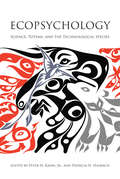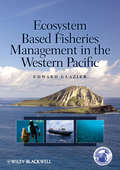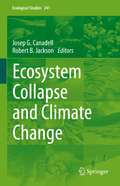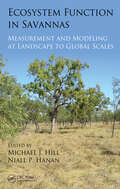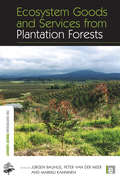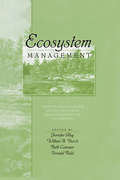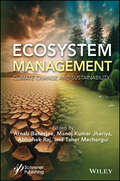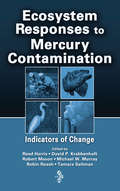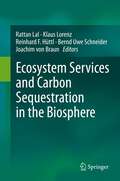- Table View
- List View
Economics of Database-Assisted Spectrum Sharing
by Yuan Luo Lin Gao Jianwei HuangThis book examines the interaction between the technical and economic issues in database-assisted dynamic spectrum networks. It explains various business models for different network settings, analyzing the user behaviors and system equilibrium under each model. With the explosive growth of mobile devices and bandwidth-hungry applications, radio spectrum is becoming increasingly congested and scarce. Database-assisted dynamic spectrum sharing is a promising technology for solving the problem of spectrum scarcity and congestion by allowing unlicensed mobile devices to dynamically access the under-utilized licensed spectrum resources through the assistance of a database. Database-assisted spectrum sharing network architecture has received wide and enthusiastic support from spectrum regulators, standards bodies, and industrial organizations. This book serves as a resource for researchers in white space communications and networking, for regulators in the wireless industry, and for graduate students and senior undergraduate students taking a course on network economics.
Economics of Forest Resources
by Gregory S. Amacher Markku Ollikainen Erkki KoskelaThe field of forest economics has expanded rapidly in the last two decades, and yet there exists no up-to-date textbook for advanced undergraduate-graduate level use or rigorous reference work for professionals. Economics of Forest Resources fills these gaps, offering a comprehensive technical survey of the field with special attention to recent developments regarding policy instrument choice and uncertainty. It covers all areas in which mathematical models have been used to explain forest owner and user incentives and government behavior, introducing the reader to the rigor needed to think through the consequences of policy instruments. Technically difficult concepts are presented with a unified and progressive approach; an appendix outlines the basic concepts from calculus needed to understand the models and results developed. The book first presents the historical and classic models that every student or researcher in forest economics must know, including Faustman and Hartman approaches, public goods, spatial interdependence, two period life-cycle models, and overlapping generations problems. It then discusses topics including policy instrument choice, deforestation, biodiversity conservation, and age-class based forest modeling. Finally, it surveys such advanced topics as uncertainty in two period models, catastrophic risk, stochastic control problems, deterministic optimal control, and stochastic and deterministic dynamic programming approaches. Boxes with empirical content illustrating applications of the theoretical material appear throughout. Each chapter is self-contained, allowing the reader, student, or instructor to use the text according to individual needs.
Economics of Nuclear Power
by Geoffrey RothwellThis book is a unique introduction to the economic costs of nuclear power. It examines the future of the nuclear power industry and unpacks the complicated relationships between its technical, economic and political variables. It does so by modelling the costs, risks and uncertainties of one of the world’s most opaque industries using micro-econometrics, econometrics, and cost engineering. Economics of Nuclear Power examines the very important costs of externalities (storing of nuclear waste and the impact of a Chernobyl or Fukushima event) and compares those to the externalities of alternative carbon based energies (oil, coal, natural gas). With over 100 tables and figures this book details nuclear power production around the world - present and planned, providing a completely global focus. It also includes an overview of the past 70 years of international nuclear power developments. This book is essential reading for students, scholars and professionals interested in energy economics, nuclear engineering and energy policy.
Economics of Power Systems: Fundamentals for Sustainable Energy (Springer Texts in Business and Economics)
by Christoph Weber Wolf Fichtner Dominik MöstIn order to manage the transition towards a sustainable future electricity system, an in-depth understanding of the key technological, economic, environmental and societal drivers for electricity markets is required. Suitable for advanced undergraduate and graduate students, this textbook provides an overview of these drivers and introduces readers to major economic models and empirical evidence for the study of electricity markets and systems. Readers will learn about electricity generation, demand, transport, and storage, as well as the fundamentals of grid and electricity markets in Europe. By introducing them to state-of-the-art models from operations research and economics, the book provides a solid basis for analytical insights and numerical modeling. Furthermore, the book discusses the policy instruments and design choices for electricity market regulation and sustainable power system development, as well as the current challenges for smart energy systems.
Economics of Property Management: The Building As A Means Of Production
by Herman Tempelmans Plat Frank HeynickThe economic analysis of a building is a complex subject and traditionally it has focused on a single aspect of the structure or a single part of the construction process. Dr Tempelmans Plat is a leading proponent of a new methodology which focuses on the building as a stock of services to be supplied over a long lifespan. This method is more realistic since it takes into account the changes in use and the adaptation of the building over its life. This book will be the first to make this method comprehensible to a wide audience of postgraduate students and professionals in the field of construction economics.
Economics of Regulation in Agriculture
by Consuelo Varela-Ortega Roel Jongeneel Floor Brouwer Alfons Weersink Jon Winsten Glenn Fox Anton Meister Irina Bezlepkina Vicki Swales Silvia De Miranda Kaley Hart Kees De RoestThis work debates and investigates the cross-compliance system - whereby farmers comply with certain standards relating to the environment, food safety and animal and plant health. It discusses cross-compliance in the context of existing standards, on-farm costs and the competitiveness of farm businesses. Analysing the economics of regulation both within the internal market of the EU and the broader world market by examining a broad range of agricultural products. This resource will be of value to agriculture and resource economists, policy makers, researchers and students in environmental and agricultural policy and modelling.
Economics of Unconventional Shale Gas Development
by William E. Hefley Yongsheng WangThis book examines the economics and related impacts of unconventional shale gas development. While focusing on the Marcellus and Utica Shales in the Mid-Atlantic region, additional insights from other regions are included to provide a broader view of these issues. Shale gas development in recent years has changed the energy discussion in the US, as existing reserves of natural gas coupled with horizontal drilling and hydraulic fracturing make exploitation of these reserves economically feasible. The importance of natural gas is seen as likely to continue to expand over the coming years, and is expected to increase even further with environmental considerations, such as greenhouse gas emissions. Horizontal drilling and hydraulic fracturing producing natural gas from deposits such as the Marcellus Shale is making the US a net producer of natural gas. Previous studies have examined the economic impact of exploration and production in the region. Other studies have addressed legal, environmental, biodiversity, and public health impacts of unconventional shale development. This is the first volume to focus solely on the economics and related financial impacts of this development. This book not only fills the research gap, but also provides information that policy makers and the public need to better understand this pressing issue.
Economics of the Food Processing Industry: Lessons from Bihar, India (Themes in Economics)
by Debdatta SahaThis book presents a wealth of perspectives on studying the manufacturing end of food processing industries, with a special focus on regions with a low industrial base and multiple missing markets, institutional finance being the most prominent example. Positioning food processing within the industrial ecosystem, which includes entrepreneurs, policymakers, business consultants and associations, the study first considers three different trajectories: for developed economies, for national territories like India, and for sub-national regions like Bihar. In turn, it shows how these trajectories intertwine in two dimensions: the region and the sub-sector. Successfully completing food-processing projects in any of these trajectories requires the identification and development of appropriate product networks that link basic processed items with advanced ones through a chain of value addition. Moreover, the supply-side narrative presented here identifies two types of costs: physical and non-physical costs of operation. For trajectories with skewed firm sizes (“missing middle”) and missing markets, which can be found in Bihar, the latter costs matter just as much as the former in terms of entrepreneurship. While efficiency in operations is studied for selected sub-sectors in Bihar’s food processing to assess the main sources of inefficiency in minimizing the physical costs of operations, non-physical costs are studied using the construct of region-based counterfactual thinking (rCFT) and its relationship with the perception of risk for entrepreneurs. rCFT offers a new concept for understanding the mindset of the entrepreneur, in which the regional identity plays a significant role. The empirical content is based on a primary survey of food processing in Bihar. Additional policy questions, such as the choice between spatial collocation of food parks or cluster-based development of unique sub-sectors, are explored through an analysis of the policy network that supports entrepreneurship. Issues arising from the government’s policy choices, particularly vertically targeted industrial policies, can influence industrial outcomes and are particularly relevant for regions like Bihar. While policy evaluation for Bihar’s processed food industry yields insights on policy targeting for decision-makers in the government, examples of parallel narratives from global experiences in comparable regions shed new light on industrial development in processed food, which should be of interest to business practitioners, academic researchers and policymakers alike.
Economics of the Pharmaceutical and Medical Device Industry: Supply Chain, Trade and Innovation (Routledge Studies in the Economics of Innovation)
by Ramesh BhardwajThis book provides a comprehensive examination of the pharmaceutical and medical device industry, including analysis of its current trade and innovation strategies.Opening with a survey of the global pharmaceutical and medical device industry, Bhardwaj outlines the growing trade and trade interdependence among countries in the global supply chain. He adopts a trade competitiveness approach to analyze patterns of product specialization and examines the drug discovery process and its challenges in translating bioscientific knowledge into lifesaving products. Bhardwaj argues that further economic integration, collaborative R&D, and digital technologies may help accelerate productivity and address global challenges of escalating drug costs, neglected tropical diseases (NTDs), and pandemic risks. The book also considers how the industry may further green its supply chain, and thus contribute to SDG Goals 3 (Good Health and Wellbeing) and 12 (Responsible Consumption and Production), before closing on a review of China and India, major players who have the potential to become drivers of low-cost medical products and innovations.With its evidence-based analysis, this book will be of great interest to researchers in pharmaceutical studies, supply chain management, global health, and health economics, as well as policymakers and professionals interested in the global issues facing the industry.
Economics, Social Sciences and Information Management: Proceedings of the 2015 International Congress on Economics, Social Sciences and Information Management (ICESSIM 2015), 28-29 March 2015, Bali, Indonesia
by Ford Lumban Gaol Fonny HutagalungThe 2015 International Congress on Economics, Social Sciences and Information Management (ICESSIM 2015), held 28-29 March 2015 in Bali, Indonesia, aimed to provide a platform for the sharing of valuable knowledge and experience in the context of changing economics and social settings. Information technology has changed many aspects in our life, inc
Economics: A Foundation Course for the Built Environment
by J.E. ManserMaking no assumption of your prior knowledge, Economics introduces the basics of economics as they relate to the built environment. Looking at the principles of microeconomics (markets, price mechanisms, resource allocation, theory of the firm, etc.), these principles are put into the context of construction firms and property markets. Lively, real-life case studies are built into the text to provide concrete examples of the theories being explained and macroeconomics are also covered. Key features of this easy-to-use book include: clear chapter structure tutorial questions linking the case histories to basic principles extracts from newspaper and journal articles to show the relevance of economics to the construction industry 100% construction orientation a useful bibliography, glossary of economic terms preview questions at the start of each chapter and exercises and discussion topics at the end to test your understanding. Economics will enable you to understand the working of economic forces as they relate to the construction industry.
Economy, Business and Uncertainty: New Ideas for a Euro-Mediterranean Industrial Policy (Studies in Systems, Decision and Control #180)
by Jaime Gil-Lafuente Francesco Carlo Morabito Domenico MarinoThis book presents original research articles addressing various aspects of economics, management and optimization. The topics discussed include economics, finance, marketing, resource allocation strategies, fuzzy logic, and network-based techniques for the analysis of economics, management and mathematical optimization.Combining the input of contributing professors and researchers from various Spanish, Italian and Latin American universities, the book will be of interest to students, researchers and practitioners, as well as members of the general public interested in the world of Economics and Management.
Economy-Wide Modeling of Water at Regional and Global Scales (Advances in Applied General Equilibrium Modeling)
by Glyn WittwerThis book deals with the economic modelling of water at the global, national and sub-national levels. It presents a multi-faceted analysis and, while it outlines the theories behind various models, its main purpose is to analyse policy issues and present insights arising from modelling, including a chapter analysing the macroeconomic implications of climate change. Arguably the most compelling reason for publishing a book on the economic modelling of water arises from the fact that agriculture accounts for approximately 70% of water used for economic purposes, while only contributing 4% of global income. Given that water is an essential commodity, this discrepancy may in part be symptomatic of an undervaluation of water due to immature and incomplete markets. In turn, this undervaluation has led to an ongoing misallocation of water. When economic models include water accounts that feed into production functions, they model impacts on the marginal product of water. Policies that improve the link between the marginal product and price of water will improve water allocation, while advanced economic models such as those presented here can enhance our ability to explore the possible impacts of improved policy.
Ecophysiology, Abiotic Stress Responses and Utilization of Halophytes
by Münir Öztürk Mirza Hasanuzzaman Kamrun NaharHalophytes are those plant species that can tolerate high salt concentrations. There are diversified species of halophytes suited for growth in various saline regions around the world, e.g. coastal saline soil, soils of mangrove forests, wetlands, marshlands, lands of arid and semiarid regions, and agricultural fields. These plants can be grown in soil and water containing high salt concentrations and unsuitable for conventional crops, and can be good sources of food, fuel, fodder, fiber, essential oils, and medicine. Moreover, halophytes can be exploited as significant and major plant species for the desalination and restoration of saline soils, as well as phytoremediation. This book highlights recent advances in exploring the unique features of halophytes and their potential uses in our changing environment.
Ecopsychology: Science, Totems, and the Technological Species
by Jr. Peter H. Kahn Patricia H. HasbachAn ecopsychology that integrates our totemic selves—our kinship with a more than human world—with our technological selves.We need nature for our physical and psychological well-being. Our actions reflect this when we turn to beloved pets for companionship, vacation in spots of natural splendor, or spend hours working in the garden. Yet we are also a technological species and have been since we fashioned tools out of stone. Thus one of this century's central challenges is to embrace our kinship with a more-than-human world—"our totemic self"—and integrate that kinship with our scientific culture and technological selves.This book takes on that challenge and proposes a reenvisioned ecopsychology. Contributors consider such topics as the innate tendency for people to bond with local place; a meaningful nature language; the epidemiological evidence for the health benefits of nature interaction; the theory and practice of ecotherapy; Gaia theory; ecovillages; the neuroscience of perceiving natural beauty; and sacred geography. Taken together, the essays offer a vision for human flourishing and for a more grounded and realistic environmental psychology.
Ecosustainable Polymer Nanomaterials for Food Packaging: Innovative Solutions, Characterization Needs, Safety and Environmental Issues
by Clara Silvestre Sossio CimminoPolymer nanotechnology offers exciting benefits to the food industry, including better materials for food packaging and safer foods on supermarket shelves with lower incidences of contamination. Ecosustainable Polymer Nanomaterials for Food Packaging: Innovative Solutions, Characterization Needs, Safety and Environmental Issues examines the complet
Ecosystem Approaches to Fisheries
by Villy Christensen Jay MacleanInspired by the work of the renowned fisheries scientist Daniel Pauly, this book provides a detailed overview of ecosystem-based management of fisheries. It explores the complex and interdisciplinary nature of the subject by bringing together contributions from some of the world's leading fisheries scientists, managers and conservationists. Combining both research reviews and opinion pieces, and reflecting the breadth of Pauly's influence within the field, the book illustrates the range of issues associated with the implementation of the ecosystem approach and the challenge of long-term sustainability. Topics covered include global biodiversity, the impact of human actions on marine life, the implications for economic and social systems and the role of science in communicating and shaping ocean policy to preserve resources for the future. This book provides a complete and essential overview for advanced researchers and those just entering the field.
Ecosystem Based Fisheries Management in the Western Pacific
by Edward GlazierAs the ecosystem-based trend in fisheries management continues to be implemented worldwide, a thorough background of this new management approach and resulting implementation strategies is needed. Ecosystem-Based Fisheries Management in the Western Pacific presents a full picture of the process changes used in switching from target species based management to EBFM, using a region that is at the forefront of this widely accepted movement. Ecosystem-Based Fisheries Management in the Western Pacific is the outgrowth of a series of three workshops convened by the Western Pacific Regional Fishery Management council. The book follows the logical approach of each workshop, beginning with an assessment of the current state of fisheries management, transitioning through the data sources and modeling systems used to advance EBFM, and ending with practical methodologies for more thorough global implementation in the future. Contributed by experts from the Pacific regions as well as the UK and Non-pacific States, this book is one of the first available compendiums on this important movement and will be applicable to fisheries scientists and researchers, fisheries managers, policy makers, and social scientists worldwide
Ecosystem Collapse and Climate Change (Ecological Studies #241)
by Robert B. Jackson Josep G. CanadellHuman-driven greenhouse emissions are increasing the velocity of climate change and the frequency and intensity of climate extremes far above historical levels. These changes, along with other human-perturbations, are setting the conditions for more rapid and abrupt ecosystem dynamics and collapse.This book presents new evidence on the rapid emergence of ecosystem collapse in response to the progression of anthropogenic climate change dynamics that are expected to intensify as the climate continues to warm. Discussing implications for biodiversity conservation, the chapters provide examples of such dynamics globally covering polar and boreal ecosystems, temperate and semi-arid ecosystems, as well as tropical and temperate coastal ecosystems.Given its scope, the volume appeals to scientists in the fields of general ecology, terrestrial and coastal ecology, climate change impacts, and biodiversity conservation.
Ecosystem Function in Savannas: Measurement and Modeling at Landscape to Global Scales
by Michael J. Hill Niall P. HananFascinating and diverse, savanna ecosystems support a combination of pastoral and agropastoral communities alongside wild and domestic herbivores that can be found nowhere else. This diversity has made the study of these areas problematic. Ecosystem Function in Savannas: Measurement and Modeling at Landscape to Global Scales addresses some of the d
Ecosystem Goods and Services from Plantation Forests (The Earthscan Forest Library)
by Jurgen Bauhus Peter Van Meer Markku KanninenPlantation forests often have a negative image. They are typically assumed to be poor substitutes for natural forests, particularly in terms of biodiversity conservation, carbon storage, provision of clean drinking water and other non-timber goods and services. Often they are monocultures that do not appear to invite people for recreation and other direct uses. Yet as this book clearly shows, they can play a vital role in the provision of ecosystem services, when compared to agriculture and other forms of land use or when natural forests have been degraded. This is the first book to examine explicitly the non-timber goods and services provided by plantation forests, including soil, water and biodiversity conservation, as well as carbon sequestration and the provision of local livelihoods. The authors show that, if we require a higher provision of ecosystem goods and services from both temperate and tropical plantations, new approaches to their management are required. These include policies, methods for valuing the services, the practices of small landholders, landscape approaches to optimise delivery of goods and services, and technical issues about how to achieve suitable solutions at the scale of forest stands. While providing original theoretical insights, the book also gives guidance for plantation managers, policy-makers, conservation practitioners and community advocates, who seek to promote or strengthen the multiple-use of forest plantations for improved benefits for society. Published with CIFOR
Ecosystem Management: Adaptive Strategies For Natural Resource Organizations in the Twenty-First Century
by William BurchThis book documents some of the perceptions, strategies, and actions of natural resource agencies in the twenty-first century as they seek to respond to the changed reality influencing their policies and practices. It considers some of the responses in tools, techniques, and organizational change.
Ecosystem Management: Climate Change and Sustainability
by Manoj Kumar Jhariya Arnab Banerjee Abhishek Raj Taher MecherguiThis book is essential for anyone who wants to understand the challenges of environmental degradation and learn about the sustainable solutions needed to address these critical issues. Today, the entire globe is suffering from various forms of environmental degradation, resource depletion, and an imbalance of natural phenomena. In this context, one of the major issues is loss of ecosystem services and proper functioning of natural ecosystems. Pollution, ecological invasion, loss of biodiversity, land degradation, and loss of productivity across various ecosystems have become the biggest challenges humankind is faced with. Considering Sustainable Development Goals 2030, the major target is to restore degraded ecosystems and their functionality, which will bring back the valuable ecosystem services of a diverse ecosystem. Ecosystem Management: Climate Change and Sustainability addresses all these issues to teach a global readership the dimensions of ecosystem services and ways toward a future sustainable world.
Ecosystem Responses to Mercury Contamination: Indicators of Change
by Robert Mason Reed Harris David P Krabbenhoft Michael W. Murray Robin Reash Tamara SaltmanAs rising levels of mercury in the environment pose an increasing threat of toxicity to humans and wildlife, several laws already call for industries to reduce mercury emissions at the source. Ecosystem Responses to Mercury Contamination: Indicators of Change outlines the infrastructure and methods needed to measure, monitor, and regulate the conce
Ecosystem Services and Carbon Sequestration in the Biosphere
by Klaus Lorenz Rattan Lal Joachim Von Braun Reinhard F. Hüttl Bernd Uwe SchneiderEcological functions and human wellbeing depend on ecosystem services. Among the ecosystem services are provisional (food, feed, fuel, fiber), regulating (carbon sequestration, waste recycling, water cleansing), cultural (aesthetic, recreational, spiritual), and supporting services (soil formation, photosynthesis, nutrient cycling). Many relationships of various degree exist among ecosystem services. Thus, land use and soil management to enhance biospheric carbon sinks for carbon sequestration requires a comprehensive understanding on the effects on ecosystem services. Payments for ecosystem services including carbon pricing must address the relationship between carbon sequestration and ecosystem services to minimize risks of overshoot, and promote sustainable use of land-based carbon sinks for human wellbeing.
